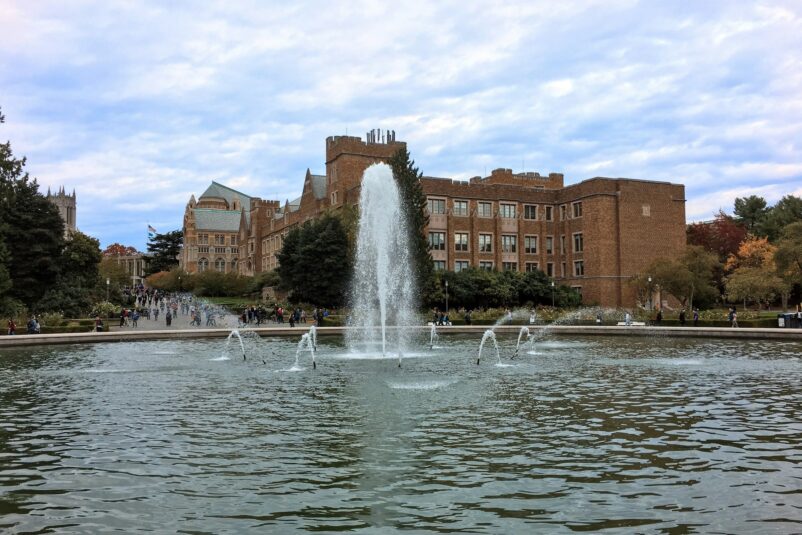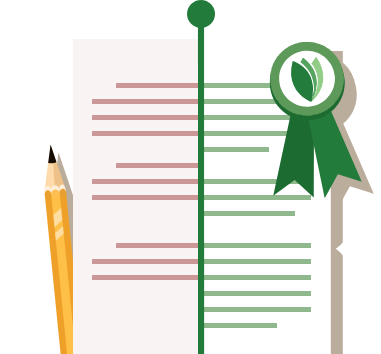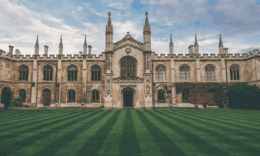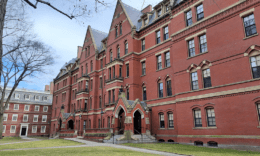The University of Washington (UW), which has three campuses in Seattle, Tacoma, and Bothell respectively, enrolls more than 60,000 students. The UW’s vibrant student life, impactful research, and diverse academic opportunities all contribute to its high U.S. News and World Report ranking at #7 in Best Global Universities. The UW’s accomplished alumni include Rainn Wilson, Frank Herbert, Tim Lincecum, and Gita Gopinath. Hoping to become a Husky? First, you’ll need to nail the University of Washington supplemental essays. Let’s dive in.

UW’s 2025-2026 Prompts
The University of Washington sets three essay prompts for applicants. The first two prompts are required, while the third prompt is optional and only applicable to students who feel that their applications are missing something crucial. A lot of emphasis is put on the University of Washington supplemental essays in the application process, so let’s break those prompts down.
Required Essay Questions
- Tell a story from your life, describing an experience that either demonstrates your character or helped to shape it. (650 words or fewer)
Optional Essay Question
- You are not required to write anything in this section, but you may include additional information if something has particular significance to you. For example, you may use this space if: You have experienced personal hardships in attaining your education. Your activities have been limited because of work or family obligations. You have experienced unusual limitations or opportunities unique to the schools you attended. (200 words or fewer)
Honors Program Essay Question
- We want to understand your enthusiasm for learning unfamiliar things and exploring different ways of thinking. Tell us why you are excited to push your education outside the areas of learning you are most comfortable with. (400 words or fewer)

General Tips
Writing the University of Washington supplemental essays is easier said than done, so here are some tips to help you write stand-out essays! Let’s dive in.
Imagine Your Reader
While writing the UW essays, it can be helpful to think through each sentence as though you are speaking it to the admissions officer who will eventually read your writing. Your reader is a stranger who may or may not have the rest of your application materials in front of them. They’re evaluating you as a person, writer, and student all at the same time. What do you want them to know about you? How do you want to say it? While writing, try to answer these questions.
Context Matters
It’s important that you provide context to the story or stories you tell about yourself. Your reader doesn’t know what kind of high school you attended or how many siblings you have. If there is information that will help your reader understand your story, you should include it. If you’re having trouble determining whether to include a certain piece of context, ask someone who doesn’t know the story you’re telling to vet whether they can understand what’s going on without the context.
Details, Details!
Details can make or break your essay. Details make an essay personal and special. On the flip-side, too many details can bog down your essay. So here’s a quick guide to what details you should include, and which you should avoid:
Include:
- Vivid, sensory details
- Personal details that show your personality
- Details about the time and place
- Humorous details (if tonally appropriate)
- Contextually necessary details (see the section above)
Avoid:
- Repetitive details (avoid using synonymous adjectives)
- Abstract details
- Long asides, regardless of whether they are humorous
- Contextually unnecessary details
With these general tips, you should have a good sense of what kind of information to include in your essays. That said, if you’re looking for more tips, check out the general tips in our other supplemental essays articles!
UW Required Essay Questions
Tell a story from your life, describing an experience that either demonstrates your character or helped to shape it. (650 words or fewer)
You may notice that this prompt looks extremely similar to the prompt for the Common App personal essay. Notably, the UW admissions team does not review the Common App essay. Their admissions team does, however, review this essay prompt. Thus, if your Common App personal essay fits within the parameters of this prompt, you can reuse it here. Check out our article on the Common App personal essay prompts for the 2024-2025 application season for more info.
Most likely, your Common App personal essay will fit within the parameters of this prompt. If it doesn’t, consider whether it is sufficiently focused on you, your life experiences, and your worldview. These are the topics a Common App personal essay should focus on, so this may be a sign to pivot your essay. If your essay does focus on you but doesn’t quite answer the prompt in describing any of your life experiences, we recommend using the same tactics as you would for a Common App personal essay to write the UW personal essay. Who knows, maybe you’ll even like your UW essay better than your Common App personal essay and opt to replace it!
UW Optional Essay Question
You are not required to write anything in this section, but you may include additional information if something has particular significance to you. For example, you may use this space if: You have experienced personal hardships in attaining your education. Your activities have been limited because of work or family obligations. You have experienced unusual limitations or opportunities unique to the schools you attended. (200 words or fewer)
For many applicants looking back at their applications, something seems missing. If there was a drop in your grades during sophomore year and nowhere else in your application did you have the opportunity to explain this situation, this essay is your chance.
If you faced a significant hardship in your personal life, perhaps you want to explore that hardship here. Or if you faced a financial or other barrier to participating in certain extracurricular activities (for instance, you were accepted into a selective academic summer camp but couldn’t afford to attend), then you may wish to provide those details in this essay.
The above are just a few of the many examples of topics you could write about in this essay. Before beginning your draft, think about your application as a whole. Does it truly show you as you are? As a student, classmate, friend, and family member? If so, then remember, this prompt is optional. But if not, you’ll want to provide details here. “Details” is a key word. You’ll need to be specific for the admissions team, who doesn’t necessarily know you very well, so they can fully understand the situation you choose to describe. Once again, be genuine and specific, and this essay has the potential to strengthen your application.
UW Honors Program Essay Question
We want to understand your enthusiasm for learning unfamiliar things and exploring different ways of thinking. Tell us why you are excited to push your education outside the areas of learning with which you are most comfortable. (400 words or fewer)
This prompt asks you to demonstrate intellectual curiosity and a willingness to embrace academic challenges beyond your established strengths. The admissions committee wants to see that you’re not just someone who sticks to familiar subjects but someone who actively seeks out new perspectives and ways of thinking. This is fundamentally about showing your growth mindset and explaining what drives you to venture into uncharted intellectual territory.
Start by identifying areas where you’re most comfortable academically—perhaps you excel in STEM subjects, have a natural affinity for languages, or thrive in creative pursuits. Then discuss specific unfamiliar areas that genuinely excite or intrigue you, explaining what draws you to them despite (or perhaps because of) their challenges. Maybe you’re a math-focused student who’s curious about philosophy because you want to understand the ethical implications of artificial intelligence, or perhaps you’re a humanities student eager to explore environmental science because you want to understand the data behind climate policy debates. The key is showing authentic curiosity rather than just listing subjects that seem impressive.
Explain what specifically excites you about pushing beyond your comfort zone. Is it the challenge of developing new ways of thinking? The opportunity to gain fresh perspectives on problems you care about? The chance to connect ideas across disciplines in ways you hadn’t considered before? Share concrete examples of times you’ve already stepped outside your comfort zone academically, whether through challenging coursework, independent reading, online courses, or conversations with people who think differently than you do. Describe what you learned from these experiences and how they changed your perspective or approach to learning. This demonstrates that your interest in intellectual exploration isn’t just theoretical but something you actively pursue. The best responses will show that you see learning outside your comfort zone not as an obligation but as an exciting opportunity for personal and intellectual growth!
If you need help polishing up your University of Washington supplemental essays, check out our College Essay Review service. You can receive detailed feedback from Ivy League consultants in as little as 24 hours.





